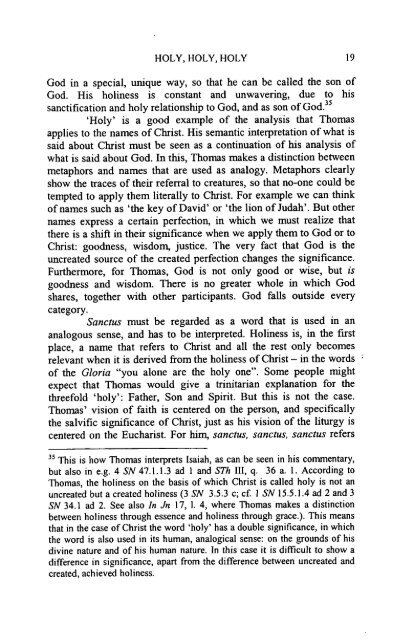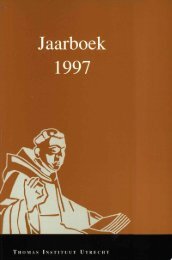Jaarboek Thomas Instituut 2006 - Thomas Instituut te Utrecht
Jaarboek Thomas Instituut 2006 - Thomas Instituut te Utrecht
Jaarboek Thomas Instituut 2006 - Thomas Instituut te Utrecht
Create successful ePaper yourself
Turn your PDF publications into a flip-book with our unique Google optimized e-Paper software.
HOLY, HOLY, HOLY 19<br />
God in a special, unique way, so that he can be called the son of<br />
God. His holiness is constant and unwavering, due to his<br />
sanctification and holy relationship to God, and as son of God.35<br />
'Holy' is a good example of the analysis that <strong>Thomas</strong><br />
applies to the names of Christ. His semantic in<strong>te</strong>rpretation of what is<br />
said about Christ must be seen as a continuation of his analysis of<br />
what is said about God. In this, <strong>Thomas</strong> makes a distinction between<br />
metaphors and names that are used as analogy. Metaphors clearly<br />
show the traces of their referral to creatures, so that no-one could be<br />
<strong>te</strong>mp<strong>te</strong>d to apply them li<strong>te</strong>rally to Christ. For example we can think<br />
of names such as 'the key of David' or 'the lion of Judah'. But other<br />
names express a certain perfection, in which we must realize that<br />
there is a shift in their significance when we apply them to God or to<br />
Christ: goodness, wisdom, justice. The very fact that God is the<br />
uncrea<strong>te</strong>d source of the crea<strong>te</strong>d perfection changes the significance.<br />
Furthermore, for <strong>Thomas</strong>, God is not only good or wise, but is<br />
goodness and wisdom. There is no grea<strong>te</strong>r whole in which God<br />
shares, together with other participants. God falls outside every<br />
ca<strong>te</strong>gory.<br />
Sanctus must be regarded as a word that is used in an<br />
analogous sense, and has to be in<strong>te</strong>rpre<strong>te</strong>d. Holiness is, in the first<br />
place, a name that refers to Christ and all the rest only becomes<br />
relevant when it is derived from the holiness of Christ - in the words<br />
of the Gloria "you alone are the holy one". Some people might<br />
expect that <strong>Thomas</strong> would give a trinitarian explanation for the<br />
threefold 'holy': Father, Son and Spirit. But this is not the case.<br />
<strong>Thomas</strong>' vision of faith is cen<strong>te</strong>red on the person, and specifically<br />
the salvific significance of Christ, just as his vision of the liturgy is<br />
cen<strong>te</strong>red on the Eucharist. For him, sanctus, sanctus, sanctus refers<br />
35 This is how <strong>Thomas</strong> in<strong>te</strong>rprets Isaiah, as can be seen in his commentary,<br />
but also in e.g. 4 SN 47.1.1.3 ad I and STh III, q. 36 a. 1. According to<br />
<strong>Thomas</strong>, the holiness on the basis of which Christ is called holy is not an<br />
uncrea<strong>te</strong>d but a crea<strong>te</strong>d holiness (3 SN 3.5.3 c; cf. I SN 15.5.1.4 ad 2 and 3<br />
SN 34.1 ad 2. See also In In 17, I. 4, where <strong>Thomas</strong> makes a distinction<br />
between holiness through essence and holiness through grace.). This means<br />
that in the case of Christ the word 'holy' has a double significance, in which<br />
the word is also used in its human, analogical sense: on the grounds of his<br />
divine nature and of his human nature. In this case it is difficult to show a<br />
difference in significance, apart from the difference between uncrea<strong>te</strong>d and<br />
crea<strong>te</strong>d, achieved holiness.








